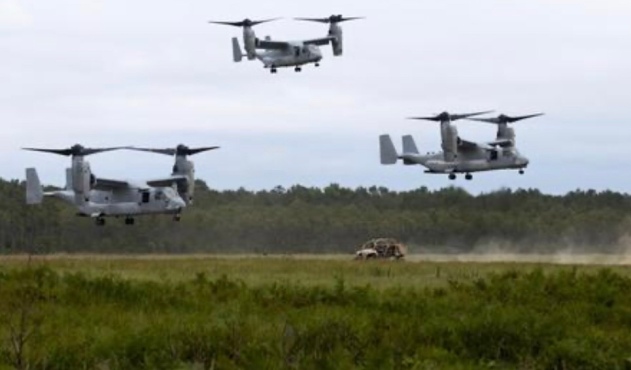Tensions between the United States and several middle eastern countries have teetered since President Trump ordered a missile strike that killed Iranian Gen. Qassam Soleimani on Jan. 3.
With some military assignments being rerouted and so much of the future unknown, military members in Eastern North Carolina stand ready to deploy — they are trained on the importance of being ready to deploy on a moment’s notice.
Marines and sailors are constantly engaged in combat and job-specific training, and units make sure their military members and their families are always prepared for deployments, said Lt. Col. Rob Shuford of the II Marine Expeditionary Force, Camp Lejeune.
“The unit maintains a high level of readiness at all levels to ensure that we are ready to deploy if called upon,” Shuford said.
Recently, Iranian Supreme Leader Ayatollah Ali Khamenei and President Trump have taken verbal shots at one another. Khamenei called the U.S. government “villainous” and said if the United States is standing with the Iranian people, “it is only to stab them in the heart with their venomous daggers,” USA Today reported.
Iraq has also requested the removal of American troops from their soil, stating the missile strike was an unacceptable breach of Iraqi sovereignty and violation of security agreements, the Associated Press reported. However, on Friday the U.S. State Department rejected the request and instead asked for Iraq and the United States to talk about how to recommit to their partnership.
In January, Fort Bragg deployed approximately 3,500 paratroopers from the 82nd Airborne Division to the Middle East, the Fayetteville Observer reported, and Camp Lejeune and New River redirected 2,500 Marines to the Mediterranean Sea, according to previous reports by The Daily News.
Shuford said units are constantly training at facilities aboard Camp Lejeune, Marine Corps Air Stations Cherry Point, New River and Beaufort, but training is not limited to these locations only.
Climate training plays a tremendous role in a military member’s readiness to be deployed and the Marine Corps also sends units to various locations around the United States and overseas in order to acclimate themselves, according to Shuford.
Shuford also stressed the importance of sending supplies, like fuel, replacement parts for vehicles and aircraft, along with food and ammunition required for the units to operate.
In addition to supplies that are ready to deploy from Camp Lejeune, Shuford said the U.S. Department of Defense maintains prepositioned equipment and supplies all over the world that can be used when needed.
However, taking care of the homefront is something Shuford explained is a critical part of the military’s overall readiness.
Ultimately, service members and unit leaders are responsible for items such as power of attorney, financial matters, housing for families, etc.; however many units have established liaisons between the families and the commands.
“Aside from unit leadership, many units have assigned Deployment Readiness Coordinators to help address any challenges that families may have preparing for a deployment, or to help during a deployment,” said Shuford.
More Headlines
N.C. Gov. Roy Cooper recently shared a long list of state government support resources for military members and their families in light of the recent deployments.
The list includes tax assistance with deadline extensions and combat zone pay provided at NCDOR.gov; rental and leasing resources like the Servicememebers Relief Act and the N.C. Servicesmembers Civil Relief Act, which provides protection for service men and women and their families, including determining eligibility for lease termination or eviction protection at NCDOJ.gov; and behavioral health services provided through the Department of Health and Human Services. To view the full list of available services visit Governor.NC.gov.
“Our brave servicemembers work tirelessly to keep us safe, and they should be able to carry out their service without worrying about loved ones back home,” Cooper is quoted as saying in the recent release. “It is important that we provide resources to servicemen and women and their families to ensure that a sudden deployment does not put them at financial or other risk.”
ENC and its residents are no strangers to the challenges they would face if the military deployed a large number of military members.
“A major deployment would mean a ghost town for the residents living here in Jacksonville,” said retired Naval Petty Officer 2nd Class Erica Nightingale, who served in the U.S. Navy for 10 years.
The area would see the effect not only in the number of military men and women being sent elsewhere, but also with their families. Nightingale said some spouses and families members choose to go home to their own families to seek help while their loved one is deployed.
However, some families choose to stay, or must stay due to the lives they’ve built in ENC.
Victoria Johnson, whose husband is stationed at MCAS Cherry Point and has been through three major deployments, said she wouldn’t move back home.
“Normally, it’s a younger couple going through their first deployment that chooses to go back home because they haven’t built that support system, however the ones that have several deployments under their belts are the ones that stay put,” she said.
Factors such as buying a house, older children, pets, and friends are some of the reasons why Johnson continues her life in ENC during deployment.
Johnson added that in some cases, like her own, she didn’t have that support system back home and it is easier not to drop everything and leave, along with not wanting to constantly move her family during every deployment.
In terms of setting up their affairs, Johnson took advantage of the Readiness Coordinators to ensure her family was set up before deployment with a general power of attorney, along with making sure her family IDs were up to date and house maintenance was taken care of.
Johnson stressed that the biggest assurance was that her family had the address of where her husband was deploying in order to send mail and care packages.
No comments:
Post a Comment